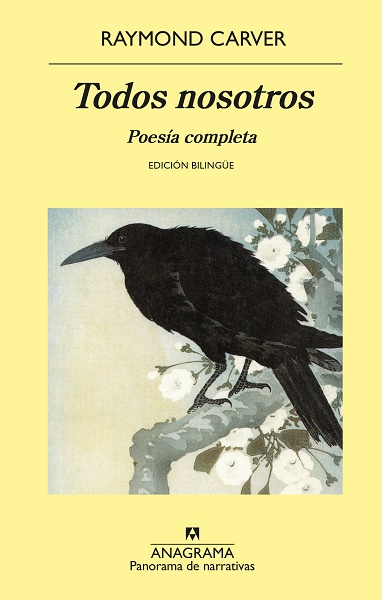Considerado como uno de los escritores estadounidenses contemporáneos más influyentes, Raymond Carver, quien naciera el 24 de mayo de 1938, falleció bastante joven —casi a los 50 años-, el 2 de agosto de 1988, producto de un cáncer pulmonar. Fue escritor de poemas y cuentos, siendo su producción en este segundo género donde alcanzó sus más reconocidos logros; sus cuentos son lo más conocido de su obra y fueron los que le dieron su fama. Su obra pertenecería en estilo a la corriente denominada minimalismo, que el Diccionario de la Lengua Española (DEL-RAE) define como: "Tendencia estética e intelectual que busca la expresión de lo esencial eliminando lo superfluo". También se valora su obra dentro del llamado realismo sucio, en cuanto que trabaja con realidades y personajes vulgares y corrientes.

Tal lo recoge la biografía de la referencia dada, Raymond Carver es de origen humilde, y tuvo que vivir momentos duros para sobrevivir con su familia inicial y con la que formó luego. Asumió diferentes trabajos de subsistencia; quizás todo ese cuadro socio-familiar lo llevó al alcoholismo, del que salió favorablemente, aunque continuó con el consumo de ciertas sustancias, como la marihuana. Sus momentos ansiosos-depresivos suscitaron momentos violentos. Comenzó a escribir después de los 20 años, gracias al apoyo de ciertos escritores que lo apoyaron en talleres y grupos literarios. También él lo haría como instructor en varias universidades y otros espacios.
Carver sostenía que la literatura podía surgir de la observación de la vida diaria, incluso a pesar de ella, como apunta Laura Emilia Pacheco. Como indiqué arriba, en los cuentos concentró esa visión realista, pero no simple, que descubre lo extraordinario que subyace en lo ordinario, en situaciones triviales, muchas veces sórdidas, secas, casi extenuadas, en una cotidianidad que puede ser poco estimulante. Su escritura es de una prosa sencilla y precisa, conversacional y de una gran agudeza descriptiva. Es esa narrativa la que logró identificar y mover a muchos lectores y escritores contemporáneos o posteriores. Su obra narrativa se concentra, fundamentalmente, en tres libros: ¿Quieres hacer el favor de callarte, por favor? (1976), De qué hablamos cuando hablamos de amor (1981) o Catedral (1983).
La crítica especializada habla de Carver como el "Chejov norteamericano". Téngase en cuenta que no sólo es el más importante cuentista ruso, sino uno de los principales exponentes del género universal. Entre sus últimos cuentos publicados está uno titulado "El encargo", que parte de la muerte de Chejov, cuento que no puedo reproducir, aunque es relativamente breve, pero que pueden leer en este enlace. En dicho relato, donde aparentemente sólo parecería mostrársenos lo más común de la muerte de Chejov en un hotel, se incorporan elementos curiosos (no sabemos si acordes con la historia real), como el médico, que lleva una botella de champaña para compartir con el enfermo, o el botones que hace su aparición para sorprender, igualmente, al moribundo.

No quiero cerrar el post sin referirme a la poesía de Carver, que, dicho por él mismo, era algo así como su guía espiritual. En un estilo completamente prosaico, podemos encontrar textos que nos atraigan y conmuevan, como me ocurre con el que a continuación les reproduzco, integrado en su libro Todos nosotros, una antología publicada en español primeramente en 2007.
Miedo
Miedo de ver un coche de policía en la entrada de casa.
Miedo de quedarme dormido de noche.
Miedo de no quedarme dormido.
Miedo del pasado que resurge.
Miedo del futuro que despega.
Miedo del teléfono que suena en mitad de la noche.
Miedo de las tormentas eléctricas.
¡Miedo de la mujer de la limpieza con un grano en la mejilla!
Miedo de perros que me han dicho que no muerden.
¡Miedo de la ansiedad!
Miedo de tener que identificar el cuerpo de un amigo muerto.
Miedo de quedarme sin dinero.
Miedo de tener demasiado, aunque la gente no se lo creerá.
Miedo de los perfiles psicológicos.
Miedo de llegar tarde y miedo de llegar antes que nadie.
Miedo de la letra de mis hijos en sobres.
Miedo de que mueran antes que yo y que me sienta culpable.
Miedo de tener que vivir con mi madre en su vejez y la mía.
Miedo de la confusión.
Miedo de que este día acabe de forma infeliz.
Miedo de despertarme y ver que te has ido.
Miedo de no amar y miedo de no amar lo suficiente.
Miedo de que lo que yo amo sea letal para quienes amo.
Miedo de la muerte.
Miedo de vivir demasiado.
Miedo de la muerte.
Eso ya lo he dicho.
Este es un poema, como podrán notar, que se concentra en el sentimiento del miedo, y lo hace usando la enumeración y la anáfora, que, obviamente, impulsa la cadencia, y, sobre todo, nos confronta con miedos quizás tan comunes, que no los hemos pensado; otros, evidentemente, sí, como el del final.
Referencias | References:
https://es.wikipedia.org/wiki/Raymond_Carver
https://en.wikipedia.org/wiki/Raymond_Carver
https://es.wikipedia.org/wiki/Minimalismo
https://en.wikipedia.org/wiki/Minimalism
https://materialdelectura.unam.mx/images/stories/pdf5/raymond-carver-89.pdf
https://www.poetica2puntocero.com/seis-poemas-de-raymond-carver/
![Click here to read in english]
#Raymond Carver: fundamental author of contemporary narrative
Considered one of the most influential contemporary American writers, Raymond Carver, who was born on May 24, 1938, died quite young –almost 50 years old-, on August 2, 1988, as a result of lung cancer. He was a writer of poems and stories, his production in this second genre being where he achieved his most recognized achievements; His stories are the best known of his work and were what gave him his fame. His work would belong in style to the current called minimalism, which the Dictionary of the Spanish Language (DEL-RAE) defines as: "Aesthetic and intellectual trend that seeks the expression of the essential while eliminating the superfluous." His work is also valued within the so-called [dirty realism ] (https://es.wikipedia.org/wiki/Realismo_sucio), in that he works with vulgar and ordinary realities and characters.
As stated in the biography of the given reference, Raymond Carver is of humble origins, and had to live through hard times to survive with his initial family and the one he later formed. He took up different subsistence jobs; Perhaps this entire socio-family situation led him to alcoholism, from which he emerged favorably, although he continued to consume certain substances, such as marijuana. His anxious-depressive moments gave rise to violent moments. He began writing after the age of 20, thanks to the support of certain writers who supported him in workshops and literary groups. He would also do so as an instructor in several universities and other spaces.
Carver maintained that literature could emerge from the observation of daily life, even in spite of it, as Laura Emilia Pacheco points out. As I indicated above, in the stories he concentrated that realistic vision, but not simple, that discovers the extraordinary that underlies the ordinary, in trivial situations, often sordid, dry, almost exhausted, in an everyday life that can be unstimulating. His writing is simple and precise, conversational prose with great descriptive acuity. It is that narrative that managed to identify and move many contemporary or later readers and writers. His narrative work is mainly concentrated in three books: Will you please shut up, please? (1976), What do we talk about when we talk about love (1981 ) or Cathedral (1983).
Specialized critics speak of Carver as the "American Chekhov." Keep in mind that he is not only the most important Russian short story writer, but also one of the main exponents of the universal genre. Among his latest published stories is one titled "The Commission", which is based on Chekhov's death, a story that I cannot reproduce, although it is relatively brief, but which you can read at this [link](https://materialdelectura.unam. mx/images/stories/pdf5/raymond-carver-89.pdf). In this story, where apparently only the most common part of Chekhov's death in a hotel seems to be shown to us, curious elements are incorporated (we do not know if they are consistent with the real story), such as the doctor, who brings a bottle of champagne to share with him. sick, or the bellman who makes his appearance to surprise, likewise, the dying.
I don't want to close the post without referring to Carver's poetry, which, as he himself said, was something like his spiritual guide. In a completely prosaic style, we can find texts that attract and move us, as happens to me with the one I reproduce below, integrated into his book All of us </ i>, an anthology published in Spanish first in 2007.
##Fear
Fear of seeing a police car in the driveway. Afraid of falling asleep at night. Afraid of not falling asleep. Fear of the past that resurfaces. Fear of the future that takes off. Fear of the phone ringing in the middle of the night. Fear of thunderstorms. Fear of the cleaning woman with a pimple on her cheek! Fear of dogs that I have been told do not bite. Fear of anxiety! Fear of having to identify the body of a dead friend. Fear of running out of money. Afraid of having too much, although people won't believe it. Fear of psychological profiles. Fear of being late and fear of arriving before anyone else. Afraid of my children's handwriting on envelopes. Afraid that they will die before me and that I will feel guilty. Fear of having to live with my mother in her old age and mine in hers. Fear of confusion. Afraid that this day will end unhappily. Afraid to wake up and see that you're gone. Fear of not loving and fear of not loving enough. Fear that what I love is lethal to those I love. Fear of death. Fear of living too long. Fear of death. I've already said that.This is a poem, as you may notice, that focuses on the feeling of fear, and it does so using enumeration and anaphora, which, obviously, drives the cadence, and, above all, confronts us with fears perhaps so common that we do not we have thought about them; others, obviously, yes, like the one at the end.





